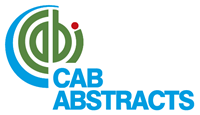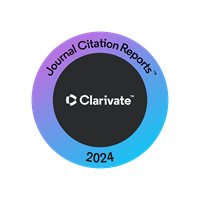Variability of harvest loss in relation to physiological characteristics of cotton
Abstract
Pearson's correlation and spatial variability are tools that can be used to help one understand the process of losses in the mechanical harvesting of cotton. Therefore, the objective of this study was to model the spatial distribution and map the losses of mechanical cotton harvest using geostatistics and to correlate the losses with agronomic variables using Pearson’s correlation. The experiment was conducted in Itiquira and Lucas do Rio Verde, Mato Grosso State, Brazil. At each sampling point, the evaluated variables were agronomic plant variables and cotton losses in the soil and the plant (divided into lower, medium and upper thirds) and the sum total of losses. The highest losses in cotton harvest occurred in the lower third and on the soil, both of which exhibit a spatial dependence model, according to geostatistics, demonstrating that they do not occur in a randomized process and are related to the specific plant. There was a relationship between the plant populations with losses in the cotton crop. The plant population can influence the spatial dependence of losses.
Downloads
References
Boquet, D. J. (2005). Cotton in ultra-narrow spacing: plant density and nitrogen fertilizer rates. Agronomy Journal, 97(1), 279-287. DOI: 10.2134/agronj2005.0279
Burrough, P. A., & Mcdonnell, R. A. (2006). Principles of geographical systems. New York, NY: Oxford University Press.
Cambardella, C. A., Moorman, T. B., Novak, J. M., Parkin, T. B., Karlen, D. L., Turco, R. F., & Konopka, A. E. (1994). Field-scale variability of soil properties in Central Iowa. Soil Science Society of American Journal, 58(5), 1501-1511. DOI: 10.2136/sssaj1994.03615995005800050033x
Empresa Brasileira de Pesquisa Agropecuária [EMBRAPA]. (2013). Sistema brasileiro de classificação de solos. Brasília, DF: Embrapa.
Ferreira, F. M., Silva, A. R. B., Silva, P. R. A., Benez, S. H., Kroth, B. E., & Ormond, A. T. S. (2014). Pluma Perdida. Cultivar Máquinas, 13(137), 34-37.
Jost, P. H., & Cothren, J. T. (2000). Growth and yield comparisons of cotton planted in conventional and ultra narrow row spacings. Crop Science, 40(2), 430-435. DOI: 10.2135/cropsci2000.402430x
Kazama, E. H. K., Silva, R. P., Ormond, A. T. S., Alcantara, A. S., & Vale, W. G. (2018). Cotton and fiber quality in function of picker harvest speed. Revista Brasileira de Engenharia Agrícola e Ambiental, 22(8), 583-588. DOI: 10.1590/1807-1929/agriambi.v22n8p583-588
Lamas, F. M. (2008). O agronegócio do algodão no Brasil: Manejo cultural do algodoeiro nas condições do Cerrado. In N. E. M. Beltrão, & D. M. P. Azevedo (Eds.), O agronegócio do algodão no Brasil: Manejo cultural do algodoeiro nas condições do Cerrado (p. 623-648). Brasília, DF: Embrapa.
Landim, P. M. B. (2006). Sobre geoestatística e mapas. Terra e Didática, 2(1), 19-33. DOI: 10.20396/TD.V2I1.8637463
Loureiro-Júnior, A., Silva, R. P., Cassia, M. T., Compagnon, A. M., & Voltarelli, M. A. (2014). Influence of the sample área in the variability of losses in the mechanical harvesting of soybeans. Engenharia Agricola, 34(1), 74-85. DOI: 10.1590/S0100-69162014000100009
Martins, M. V., Carvalho, M. P., Andreotti, M., & Montanari, R. (2009). Correlação linear e espacial entre a produtividade do feijoeiro e atributos físicos de um Latossolo Vermelho distroférrico de Selvíria, Estado de Mato Grosso do Sul. Acta Scientiarum. Agronomy, 31(1), 147-154. DOI: 10.4025/actasciagron.v31i1.6641
Mattioni, F., Figueiredo, M. C., Marcos-Filho, A. J., & Guimarães, S. C. (2012). Vigor de sementes e desempenho agronômico de plantas de algodão. Revista Brasileira de Sementes, 34(1), 108-116. DOI: 10.1590/S0101-31222012000100014
Mauney, J. R. (1984). Anatomy and morphology of cultivated cottons. In R. J. Kohel, & C. F. Lewis (Eds.), Cotton (p. 58-80). Madison, WI: American Society of Agronomy.
Montanari, R., Souza, G. S. A., Pereira, G. T., Marques Jr, J., Siqueira, D. S., & Siqueira, G. M. (2012). The use of scaled semivariogramas to plan soil sampling in sugarcane fields. Precision Agriculture, 13(5), 542-552. DOI: 10.1007/S11119-012-9265-6
Mota, F. S. d. (1976). Metereologia agrícola. São Paulo, SP: Nobel.
Nagashima, G. T., Miglioranza, E., Marur, C. J., Yamaoka, R. S., & Gomes, J. C. (2007). Embebição de sementes e aplicação foliar com cloreto de mepiquat no crescimento e produção do algodoeiro. Ciência e Agrotecnologia, 31(4), 1027-1034. DOI: 10.1590/S1413-7054200700040001
Sana, R. S., Anghinoni, I., Brandão, Z. N., & Holzschuh, M. J. (2014). Variabilidade espacial de atributos físico-químicos do solo e seus efeitos na produtividade do algodoeiro. Revista Brasileira de Engenharia Agrícola e Ambiental, 18(10), 994-1002. DOI: 10.1590/1807-1929/agriambi.v18n10p994-1002
Silva, R. P. d., Cortez, J. W., Voltarelli, M. A., Cassia, M. T., & Furlani, C. E. A. (2013). Variabilidade espacial das perdas na colheita mecanizada do algodoeiro com diferentes armações de coleta. Comunicata Scientiae, 4(3), 293-301.
Silva, R. P. d., Souza, F. G., Cortez, J. W., Furlani, C. E., & Vigna, G.P. (2007). Variabilidade espacial e controle estatístico do processo de perdas na colheita mecanizada do algodoeiro. Engenharia Agrícola, 27(3), 742-752. DOI: 10.1590/S0100-69162007000400018
Soares, J. J., Lara, F. M., Silva, C. A. D., Almeida, R. P., & Wanderley, D. S. (1999). Influência da posição do fruto na planta sobre a produção do algodoeiro. Pesquisa Agropecuária Brasileira, 34(5), 755-759. DOI: 10.1590/S0100-204X1999000500005
Souza, J. G., Beltrão, N. E. M., Azevedo, D. M. P d., Albuquerque, W. G., Lima, R. L. S., & Cardoso, G. D. (2008). Fisiologia. In N. E. M. Beltrão, & D. M. P. Azevedo (Eds.), O agronegócio do algodão no Brasil (p. 221-249). Brasília, DF: Positiva.
Souza, Z. M., Marques Júnior, J., Pereira, G. T., & Moreira, L. F. (2004). Variabilidade espacial do pH, Ca, Mg e V% do solo em diferentes formas do relevo sob cultivo de cana-de-açúcar. Ciência Rural, 34(6), 1763-1771. DOI: 10.1590/S0103-84782004000600015
Vieira, C. P., Cunha, L. J. C., & Zofoli, R. C. (2001). Colheita. In Embrapa Agropecuária Oeste (Ed.), Algodão: Tecnologia de produção (p. 273-276). Dourados, MS: Embrapa.
Webster, R., & Oliver, M. A. (2009). Geostatistics for environmental scientists. Chinchester, UK: Oxford University Press.
Wullschleger, S. D., & Oosterhuis, D. M. (1990). Photosynthetic carbon production and use by developing cotton leaves and bolls. Crop Science, 30(6), 1259-1264. DOI: 10.2135/cropsci1990.0011183X003000060021x
Zerbato, C., Silva, V. F. A., Torres, L. S., Silva, R. P., & Furlani, C. E. A. (2014). Peanut mechanized digging regarding to plant population and soil water level. Revista Brasileira de Engenharia Agrícola e Ambiental, 18(4), 459-465. DOI: 10.1590/S1415-43662014000400015
DECLARATION OF ORIGINALITY AND COPYRIGHTS
I Declare that current article is original and has not been submitted for publication, in part or in whole, to any other national or international journal.
The copyrights belong exclusively to the authors. Published content is licensed under Creative Commons Attribution 4.0 (CC BY 4.0) guidelines, which allows sharing (copy and distribution of the material in any medium or format) and adaptation (remix, transform, and build upon the material) for any purpose, even commercially, under the terms of attribution.





















































